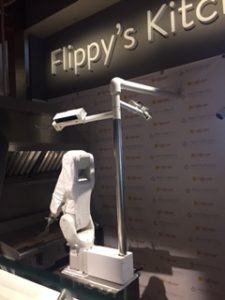Flippy, California’s and the world’s first automated fast-food grill master, has been fired. But after a few tweaks, he will be rehired. The same can’t be said about the humans who will lose their jobs to robots due to the state’s minimum wage.
Flippy worked one day at the Pasadena location of Caliburger. Apparently, he and the human staff couldn’t handle the extra business generated by the rush of customers who wanted their burger cooked by a robot. Flippy needs new coding.
Eventually, Flippy will be joined by robotic arms in other restaurants once they are able to work at lower costs than human workers. Already, restaurants are adopting order-and-pay kiosks and using automation rather than employing flesh and blood workers.
“With government driving up the cost of labor, it’s driving down the number of jobs,” former CKE Restaurants CEO Andy Puzder explained two years ago, as he was publicly contemplating further automation for CKE’s Carl’s Jr. and Hardee’s chains after visiting a fully automated Eatsa restaurant.
“You’re going to see automation not just in airports and grocery stores, but in restaurants.”
Puzder’s observation has been confirmed by an academic study from economists Grace Lordan of the London School of Economics and David Neumark of University of California, Irvine. They found that “increasing the minimum wage decreases significantly the share of automatable employment held by low-skilled workers, and increases the likelihood that low-skilled workers in automatable jobs become nonemployed or employed in worse jobs.”
“The findings imply that groups often ignored in the minimum wage literature are in fact quite vulnerable to employment changes and job loss because of automation following a minimum wage increase.”
They note that for every $1 increase in the minimum wage, there was a full percentage point drop in manufacturing jobs.
This doesn’t make the case for policies that would hold back automation’s progress, such as a statewide payroll tax on “job-stealing machines” that’s been suggested by San Francisco Supervisor Jane Kim. But it does make a solid argument against increasing the minimum wage.
At $11 an hour, California’s minimum wage is the nation’s second-highest, far higher than the federal $7.25 minimum wage. Scheduled increases will take California’s minimum wage to $15 an hour on Jan. 1, 2022.
Some cities have their own minimum-wage laws and their experiences are instructive. San Francisco’s minimum wage, which hits $15 an hour beginning July 1, has forced some Bay Area restaurants to go out of business, according to a Harvard study, taking jobs with them.
A “restaurant recession” in San Diego has been blamed on two recent bumps in the city’s minimum wage over the state’s that were approved by voters who were “cheered by the city council,” according to the Union Tribune.
Though automation roils an economy, disruption produces the better jobs and more affordable consumer products that are the hallmarks of an advanced economy. Robotics should not be feared. They should be given every opportunity to develop.
But don’t inadvertently rush automation by continually hiking the minimum wage. Let humans compete with robots for jobs instead. Competition is an essential component of an open economy.
Yes, robots will ultimately win the labor competition. One estimate says that automation will eventually perform 80 percent of today’s work. Humans won’t necessarily become unemployed, or underemployed, however. They will often find better employment, while the bulk of the economy’s participants will enjoy vastly improved lives. This is the lesson from the Industrial Revolution.
Minimum wage not only restricts workers’ ability to compete with each other, it limits their capacity to compete with robots. Policymakers need to consider what they have done.
Kerry Jackson is a fellow with the Center for California Reform at the Pacific Research Institute.
